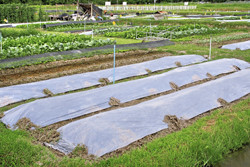New biodegradable mulch films
Mulch films are used worldwide, but they are not traditionally biodegradable. As such, they need to be manually removed after each harvest, which is environmentally unfriendly (impossible to remove all plastic pieces from the soil) and time consuming. The EU-funded 'Development of enhanced biodegradable films for agricultural activities' (AGROBIOFILM)(opens in new window) project set out to manufacture and test a range of starch-based biodegradable mulch films (BMFs) in field conditions. Thirty-six BMFs were manufactured in different colours, thicknesses and formulations, and they were tested on peppers, strawberries, melons and grapevines. Overall, the BMFs showed good mechanical properties, both for short crop cycles (4-5 months) and long crop cycles (10 months). However, in the presence of nut sedge (Cyperus rotundus) large infestation the BMF solution must be reviewed in terms of elasticity and thickness. Generally speaking, the BMFs performed as well as conventional films in terms of crop production and fruit quality. In the case of vines, mulch films anticipated the first harvest in one year (18t/ha just 17 months after planting) and greatly improved production for several years after planting, despite the fact that they degraded within a year. This early degradation, when compared with polyethylene mulch, improved the root system growth of BMF mulched vines. BMFs biodegradation was tested both for perennial and horticultural crops. In horticultural crops the BMF mulches meant to be incorporated in the soil and thus it is crucial that mulch film biodegradation does not interfere with subsequent crops. BMF was tested according ISO 17556 and reached more than 70% in 160 days, which is ideal for annual crops grown using mulch films. Life-cycle analysis showed that BMFs have an advantage over conventional films through reduced energy use during production.AGROBIOFILM BMF products are already commercially available to farmers in the global market.







